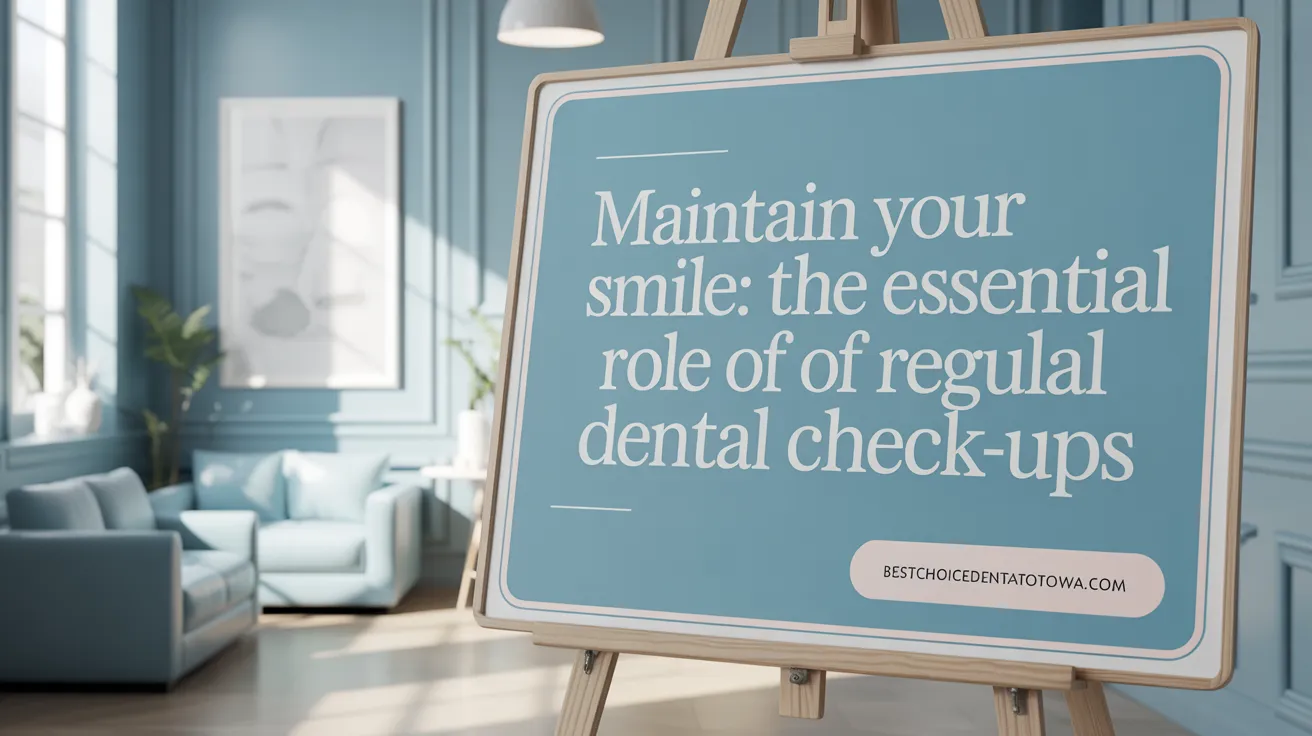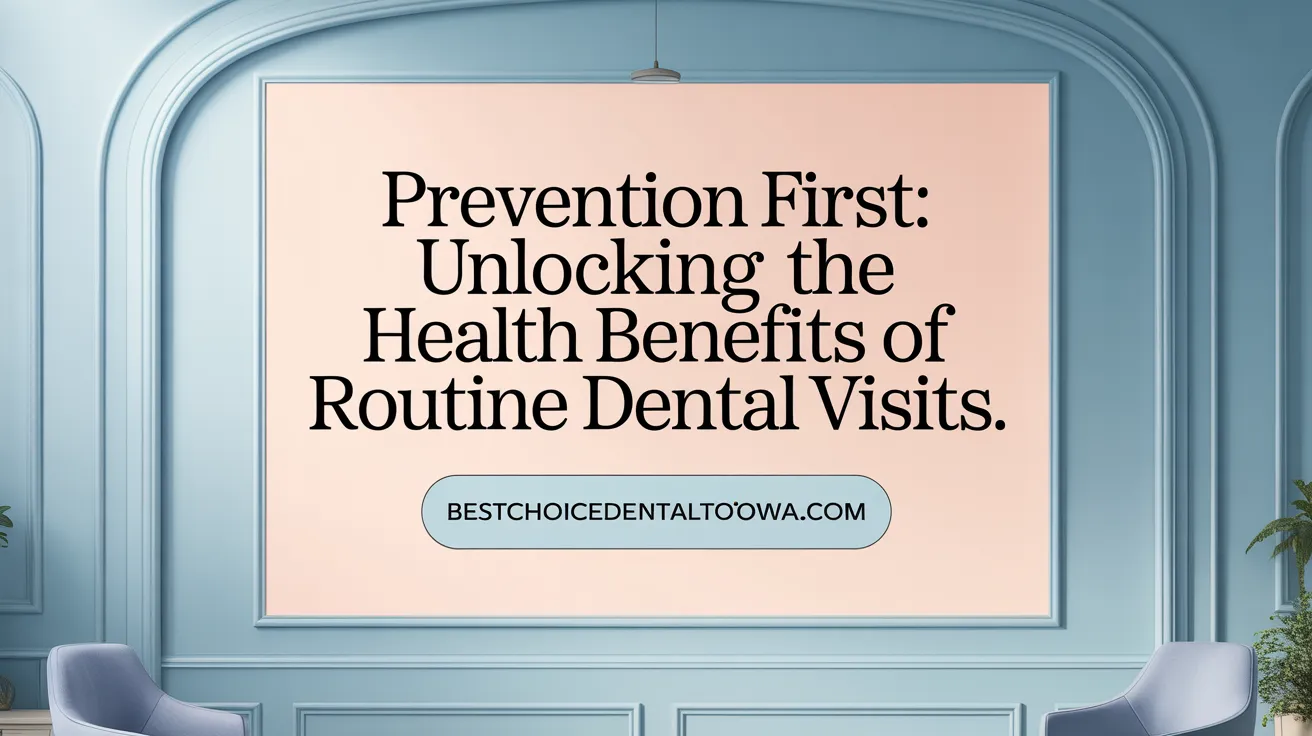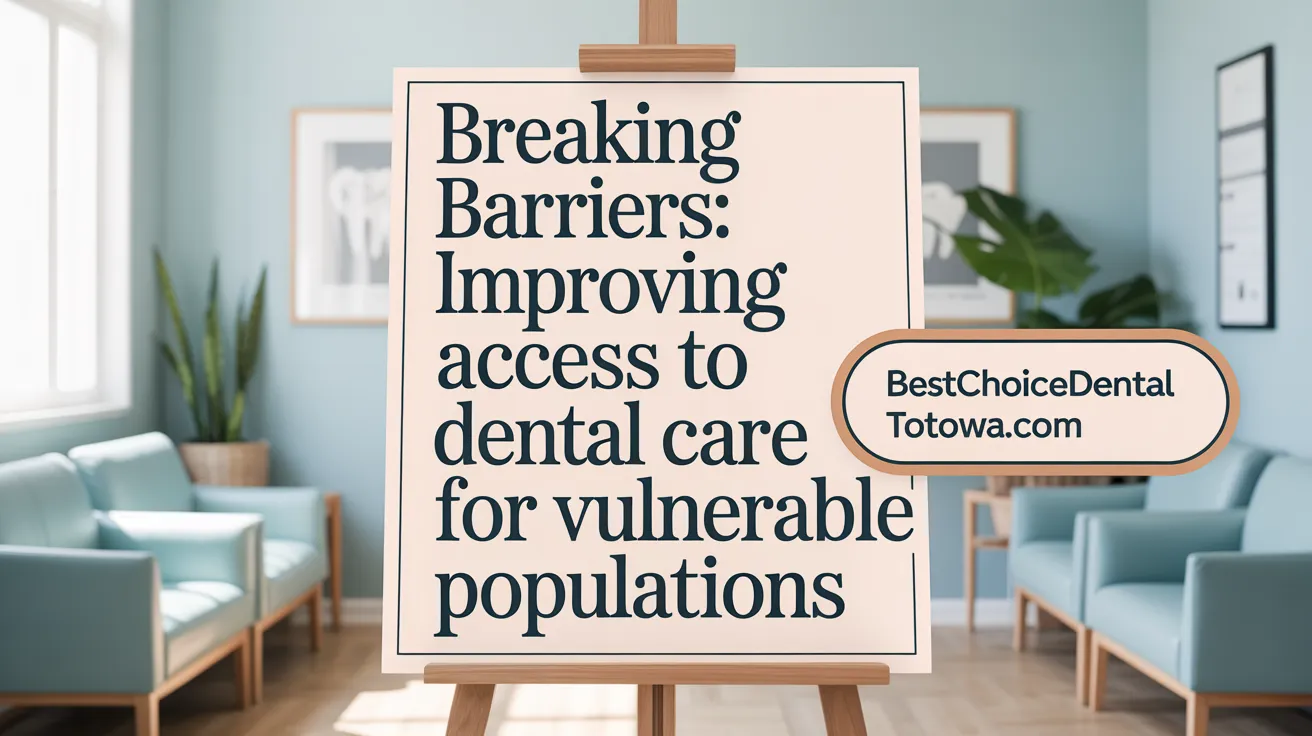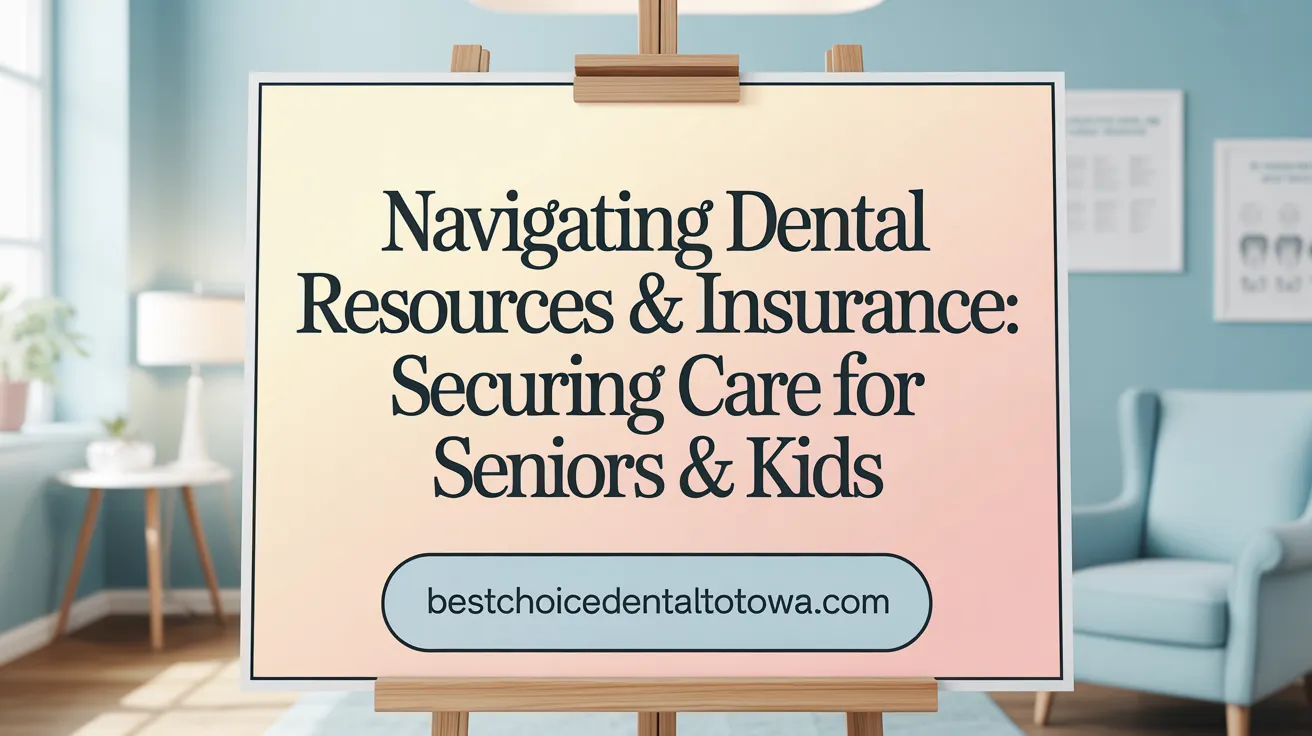Oral Health as a Cornerstone of Overall Wellbeing
Regular dental check-ups are fundamental to maintaining oral health and preventing complex dental issues for both seniors and children. This article explores why consistent dental care is vital at these critical life stages, detailing the health benefits, prevention strategies, and systemic connections that underscore the importance of routine visits. By understanding the challenges and embracing best practices, caregivers and health professionals can empower these vulnerable populations toward healthier smiles and improved quality of life.
Why Regular Dental Check-Ups Are Vital for Maintaining Oral Health

Why are regular dental check-ups important for maintaining oral health?
Regular dental visits play a crucial role in preserving oral health and preventing serious problems. They allow early detection of issues such as cavities, gum disease, and even oral cancer, often before symptoms are noticeable. This early diagnosis is vital because it enables timely treatment, which can prevent pain, complex procedures, and higher costs down the line.
Professional dental cleanings are a key component of check-ups. These cleanings remove plaque and tartar—bacteria buildup that regular brushing and flossing might miss—reducing the risk of cavities and gum inflammation. Dentists also examine the health of teeth and gums, identify early signs of disease, and assess for other conditions like dry mouth or oral lesions.
During a routine visit, dentists provide personalized advice on proper oral hygiene practices, dietary choices, and habits that impact dental health, such as smoking or teeth grinding. They can also recommend cosmetic procedures like whitening or orthodontics.
There is a clear connection between oral and systemic health. Poor oral health is linked to various health issues, including heart disease, diabetes, and respiratory infections. Routine check-ups contribute not only to a healthier smile but also to overall well-being. Learn more about the link between oral health and overall health.
From a financial perspective, preventive care through regular dental visits is cost-effective. Detecting and addressing issues early reduces the need for expensive treatments like root canals or extractions. Overall, consistent dental check-ups are an essential practice for maintaining a healthy mouth and supporting general health. For more on the benefits of routine dental visits, see this resource.
The Unique Dental Challenges and Needs of Seniors and Children

What are the common dental issues faced by seniors and children, and how can regular check-ups help manage these problems?
Older adults often encounter specific dental problems such as gum disease (periodontitis), tooth loss, dry mouth (xerostomia) caused by medications or health conditions, and root decay due to receding gums. These issues can contribute to difficulties in chewing, speaking, and maintaining proper nutrition, as well as increasing the risk for systemic conditions like heart disease and diabetes.
Children frequently experience dental caries (cavities), especially in primary teeth, which are highly susceptible to decay if good oral hygiene is not maintained. Other common pediatric issues include misaligned teeth and early signs of tooth decay.
Routine dental check-ups play a vital role in managing these problems. For seniors, regular visits facilitate early detection of gum disease and decay, management of dry mouth, and monitoring of restorations like crowns and dentures. This preventative approach helps maintain overall health and enhances quality of life.
In children, routine visits ensure early identification of cavities, proper development of permanent teeth, and timely orthodontic assessments. These visits are essential in underserved communities where disparities in dental health are prevalent. Early intervention through regular check-ups reduces pain, improves dental function, and prevents more extensive, costly procedures later.
Overall, consistent dental care allows for early intervention, helps close health gaps among vulnerable populations, and promotes sustained oral health across age groups.
More info search query: dental issues in seniors and children
The Health Benefits and Preventive Role of Routine Dental Visits
 Regular dental checkups play a crucial role in maintaining overall health, especially for vulnerable groups like seniors and children. These routine visits facilitate early detection of dental conditions such as cavities, gum disease, and oral cancer, which can often be asymptomatic in their initial stages. During these visits, dental professionals perform thorough examinations, including the use of X-rays and other diagnostic tools, to uncover issues hidden beneath the surface.
Regular dental checkups play a crucial role in maintaining overall health, especially for vulnerable groups like seniors and children. These routine visits facilitate early detection of dental conditions such as cavities, gum disease, and oral cancer, which can often be asymptomatic in their initial stages. During these visits, dental professionals perform thorough examinations, including the use of X-rays and other diagnostic tools, to uncover issues hidden beneath the surface.
Professional cleanings and treatments, like tartar removal, fluoride application, and sealants, help prevent decay and protect teeth from future problems. For children, early detection of orthodontic issues and monitoring of growth are vital, while in seniors, managing age-related issues like dry mouth and receding gums is essential for quality of life.
Personalized care tailored to different age-specific needs ensures effective prevention. Regular visits not only avoid unexpected dental emergencies but also reduce long-term treatment costs by catching problems early when they are easier and less expensive to treat (source).
Screenings for oral cancer are essential components of dental visits, especially for high-risk populations. The use of X-rays and other diagnostic tools enhances the ability to identify issues early, preventing them from progressing into more serious concerns (source).
Overall, routine dental visits promote good oral hygiene, support systemic health, and foster lifelong healthy habits, making them a vital part of preventive health strategies for all ages (source).
Best Practices for Promoting Good Oral Health Habits Across Lifespan
How can good oral health habits be promoted effectively from early childhood through old age?
Promoting good oral health habits throughout life involves a combination of education, routine practices, and community support. Starting in early childhood, parents and caregivers play a vital role by teaching gentle brushing twice daily with fluoride toothpaste, supervising the activity, and ensuring children develop the habit of flossing once teeth touch. Initiating dental visits by age one helps children adapt to professional care early, establishing a dental care routine that promotes lifelong oral health (Oral health tips for children, Healthy mouth and teeth, Early dental visits for babies).
As children grow, ongoing education about healthy eating—limiting sugary snacks and drinks—and proper oral hygiene techniques strengthens their habits. Schools and community programs can reinforce these routines by providing preventive services like sealants and fluoride varnish, which protect against cavities (Maintaining oral health in young children, Oral health in childhood, Dental care for children starting at 1 year).
For adults, regular dental checkups every six months facilitate early detection of problems such as cavities, gum disease, or oral cancer. Workplace and public health campaigns increase awareness of the importance of routine care. Healthcare providers should personalize guidance, especially for individuals with health conditions like diabetes or xerostomia, which require special attention (Importance of regular dental visits, Regular dental checkups benefits, Dental preventive visit overview, Maintaining oral health in seniors).
In old age, adaptations such as using softer toothbrushes, fluoride rinses, or saliva substitutes help address physical limitations and dry mouth. Professional cleanings and screenings are critical, as they can detect age-related issues early and prevent complications (Senior's guide to dental care, Oral health among elderly, Dental care for seniors).
Maintaining overall health is also crucial: avoiding tobacco and excessive alcohol, managing chronic diseases, and consuming a balanced diet rich in calcium and vitamins enhance oral health (Oral health tips for older adults, Good oral hygiene practices).
Through continuous education, accessible dental care, and tailored advice, good oral hygiene habits can be ingrained at every stage of life, preventing disease and supporting overall wellness (The importance of preventive dental care, Lifelong dental health importance, Benefits of regular dental check-ups).
Addressing Challenges and Enhancing Access to Dental Care for Seniors and Children
 Access to dental care for vulnerable populations like seniors and children faces numerous obstacles that impact their oral health outcomes. Among primary challenges are financial and insurance barriers. Many older adults, especially those on Medicare, lack comprehensive dental coverage, which makes costly procedures such as dentures, periodontal treatments, or root canals unaffordable. This results in many seniors delaying or forgoing necessary care, leading to more severe dental problems over time (Senior Dental Insurance, Medicare dental coverage options, Unique Oral Health Needs Among Elderly Individuals).
Access to dental care for vulnerable populations like seniors and children faces numerous obstacles that impact their oral health outcomes. Among primary challenges are financial and insurance barriers. Many older adults, especially those on Medicare, lack comprehensive dental coverage, which makes costly procedures such as dentures, periodontal treatments, or root canals unaffordable. This results in many seniors delaying or forgoing necessary care, leading to more severe dental problems over time (Senior Dental Insurance, Medicare dental coverage options, Unique Oral Health Needs Among Elderly Individuals).
Mobility and physical limitations further complicate access. Seniors with arthritis, decreased mobility, or vision impairments may find it difficult to travel to dental offices or properly perform daily oral hygiene (Senior's guide to dental care, Dental care for seniors). Similarly, young children depend on caregivers for effective brushing and dental visits, and transportation issues can hinder attendance (Oral health tips for children, Healthy mouth for kids).
Low oral health literacy and fear of dental treatment also deter regular visits. A lack of awareness about the importance of routine care, combined with dental anxiety or previous negative experiences, contributes to irregular attendance, especially in underserved communities (Dental visits statistics, Importance of Regular Dental Checkups for Seniors).
Disparities influenced by socioeconomic factors are significant. Children from low-income families often have reduced access due to cost, transportation, and limited availability of community-based services (Colorado Dental Health Care Program for Low-Income Seniors, Children's dental services and insurance). Racial and cultural disparities further widen the gap, with minority groups experiencing higher rates of untreated decay and fewer dental visits (Oral health in childhood disparities).
Support programs targeted at low-income seniors and children play a vital role in bridging these gaps. Initiatives such as state-funded dental programs for seniors and school-based oral health services for children aim to improve affordability and access. For example, some states provide free or subsidized care for low-income seniors through specialized Medicaid plans, while school programs offer preventive care and sealants to at-risk children (Ontario Seniors Dental Care Program, Pediatric Dentistry San Jose).
Policy efforts and Medicare/Medicaid considerations are also crucial. Expanding dental coverage in Medicare remains a policy goal, as current limitations leave many seniors without essential preventive and restorative services. Medicaid provides essential dental benefits for children, but coverage varies by state for adults, often excluding many who need care most (Medicare dental coverage, Dental service coverage under Medicare).
Addressing these barriers requires a coordinated approach: increasing funding for public programs, extending coverage under traditional insurance plans, expanding the dental workforce in underserved areas, and raising awareness about available resources. Community outreach, education, and service innovation are vital strategies in ensuring that both seniors and children can access the dental care they need to maintain good oral health and overall well-being (Periodic dental control benefits, The importance of regular dental visits, Oral health tips for children).
Dental Care Resources, Insurance, and Economic Impact for Seniors and Children
 Several programs and resources are available to support dental care for vulnerable populations like seniors and children. The Colorado Dental Health Care Program for Low-Income Seniors provides comprehensive services, including exams, dentures, and periodontal treatments, to eligible seniors aged 60 and older with income at or below 250% of the federal poverty level. This program, created by Senate Bill 14-180, offers nearly full state coverage and can be accessed via a list of approved local dentists. Additionally, the Senior Low Income Pension Dental Program grants basic care to seniors receiving Medicaid or Old Age Pension benefits, regardless of current coverage status.
Several programs and resources are available to support dental care for vulnerable populations like seniors and children. The Colorado Dental Health Care Program for Low-Income Seniors provides comprehensive services, including exams, dentures, and periodontal treatments, to eligible seniors aged 60 and older with income at or below 250% of the federal poverty level. This program, created by Senate Bill 14-180, offers nearly full state coverage and can be accessed via a list of approved local dentists. Additionally, the Senior Low Income Pension Dental Program grants basic care to seniors receiving Medicaid or Old Age Pension benefits, regardless of current coverage status.
Community health centers, dental schools, and veteran services also offer reduced-cost or free dental treatments. For seniors, these clinics often provide preventive services, emergency care, and even implants at lower costs. For children, dental coverage is mandated as an essential benefit in many health plans. Many private insurers and marketplace plans provide dental options bundled with health insurance or as stand-alone policies, with coverage ranging from preventive services like cleanings to more extensive procedures such as fillings and crowns.
However, Medicaid and Medicare have notable limitations. While Medicaid covers children's dental care thoroughly, adult coverage varies by state and often is limited or absent in Medicare, which generally does not include routine dental services unless provided during hospital stays or for related medical procedures. This gap underscores the importance of supplemental insurance or community programs, as detailed in Medicare dental coverage options and challenges discussed in Unique oral health needs of elderly individuals.
Preventive dental care plays a significant role in reducing long-term costs. Early detection of cavities and gum disease through regular checkups and cleanings minimizes expensive treatments later, such as root canals or tooth extractions. Additionally, preventive measures like fluoride applications and sealants prevent decay and periodontal issues that could escalate into systemic health problems—such as cardiovascular disease and diabetes—ultimately saving billions in healthcare expenditures. This is supported by evidence in The importance of regular dental visits and Dental preventive visits and overall health. Community clinics, educational campaigns, and policy measures further support efforts to eliminate disparities, ensuring equitable access to essential dental services and promoting health equity among seniors and children, as highlighted in Periodic dental control benefits and Maintaining and Improving the Oral Health of Young Children.
Sustaining Oral Health for Lifelong Wellness
Regular dental check-ups serve as a pivotal component in safeguarding oral health and overall well-being for both seniors and children. Through early detection, preventive care, and ongoing education, routine visits help manage common age-specific dental challenges and foster healthy habits that endure a lifetime. Addressing barriers to access through comprehensive resources, insurance options, and community support is essential to promote equitable oral healthcare and reduce disparities. Ultimately, investing in consistent dental care leads to improved quality of life, reduced systemic health risks, and cost savings by avoiding advanced treatments. Prioritizing dental health at every stage of life anchors a foundation for healthier aging and stronger development in youth, underscoring the critical role of regular dental check-ups in lifelong wellness.
